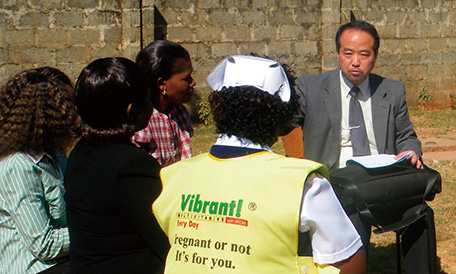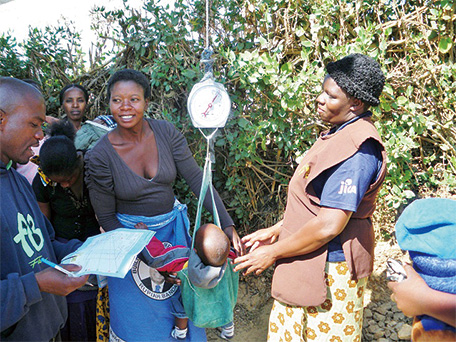Japan's Official Development Assistance White Paper 2012
Stories from the field 15
Project Aims to Reduce Infant and Child Mortality Rate in Zambia
– AMDA-MINDS Works on Project for Strengthening Child Health Promotion System –

Mr. Suzuki checking the progress of activities with the Ministry of Health monitoring team and health care center staff members (Photo: Shunsuke Suzuki)
In the southern African nation of Zambia, 119 of every 1,000 children aged zero to five years die before reaching school age. This amounts to around 25,000 children per month.
The government of Zambia was quite pleased with the results of JICA's 10-year project to improve the health care system in urban communities of the capital of Lusaka, which began in 1997. It asked the Japanese government to implement the Project for Strengthening Community-based Child Health Promotion System in Urban Areas, a technical cooperation that JICA launched in March 2011. The project seeks to improve health systems in the selected urban areas beyond Lusaka to lower the child mortality rate. A private company is teaming up with AMDA Multisectoral & Integrated Development Services (AMDA-MINDS), a specified nonprofit organization well versed in the improvement of health care services to provide this technical cooperation.
Shunsuke Suzuki is a project leader who works with six other long- and short-term experts. "I believe the government of Zambia has put forth considerable effort, but the insufficient public sector budget, inadequate human resources in the medical and health fields and the difficulty for international aid to reach every corner of society has left it unable to produce desired results," Mr. Suzuki said of the challenges associated with the infant and child mortality rates. "The urban areas are missing the traditional human relations seen in the countryside, parents are not able to earn enough money though they both work, and people are not receiving proper education about nutrition and hygiene. It is important to take the approach of strengthening the health system itself to solve these problems because so many factors are coming together to cause them."
Under the Ministry of Health, local health offices in each province and district and health centers belonging to each catchment area provide both curative and preventive services. At the community level, neighborhood health committee members and health volunteers respond to the local population who seek medical help for their children. One committee member is elected for roughly every 500 households, and the members help manage health centers and primary health care activities. Health volunteers, on the other hand, receive training on the subjects such as nutrition, major diseases and personal hygiene, and they use their level of knowledge to play a central role in administering regular physicals and other services for infants and children as well as in environmental hygiene activities.

Health care volunteers monitoring the growth of a child (Photo: Shunsuke Suzuki)
However, while these frameworks exist in theory, the question of whether they are actually serving their purposes is a different matter. The Ministry of Health will cooperate with this project, which will determine whether health systems based in three local communities are functioning to their fullest. The project also seeks to help administer training programs to shore up weaknesses and enhance the system so that infants and children have continuous access to preventive health care services.
One type of training provided by the Ministry of Health to which Mr. Suzuki and his coworkers assist will deepen mutual trust between health center staff and volunteers by having them learn together for six weeks. "The people who live in each area are the ones who know it best," Mr. Suzuki said. "Some poor people whose children are battling health problems will not seek help at a health center on their own. Only fellow locals can give those people the courage to take the first step. If health centers and volunteers band together, they can spur activity in their communities and come closer to solving problems."
This project focusing on three urban areas of Zambia has been encouraging the counterpart health officers to observe, analyze and learn from the way community-based preventive health services are managed in Lusaka. They are greatly inspired and become more convinced that they can improve their own situations as well. This project will end in March 2014, but its terminal evaluation will be conducted six months before that, so there is not much time left. Mr. Suzuki believes that any result this project can produce in these areas will have an effect on other areas, and he is scrambling to push the project along and figure out how to produce those results in this limited amount of time.
